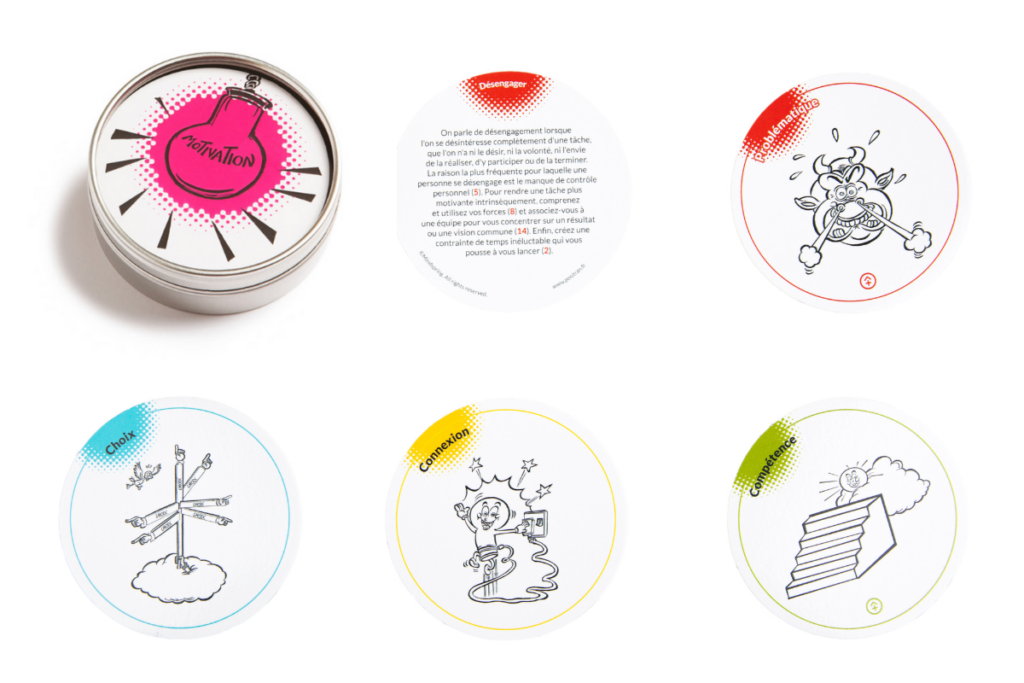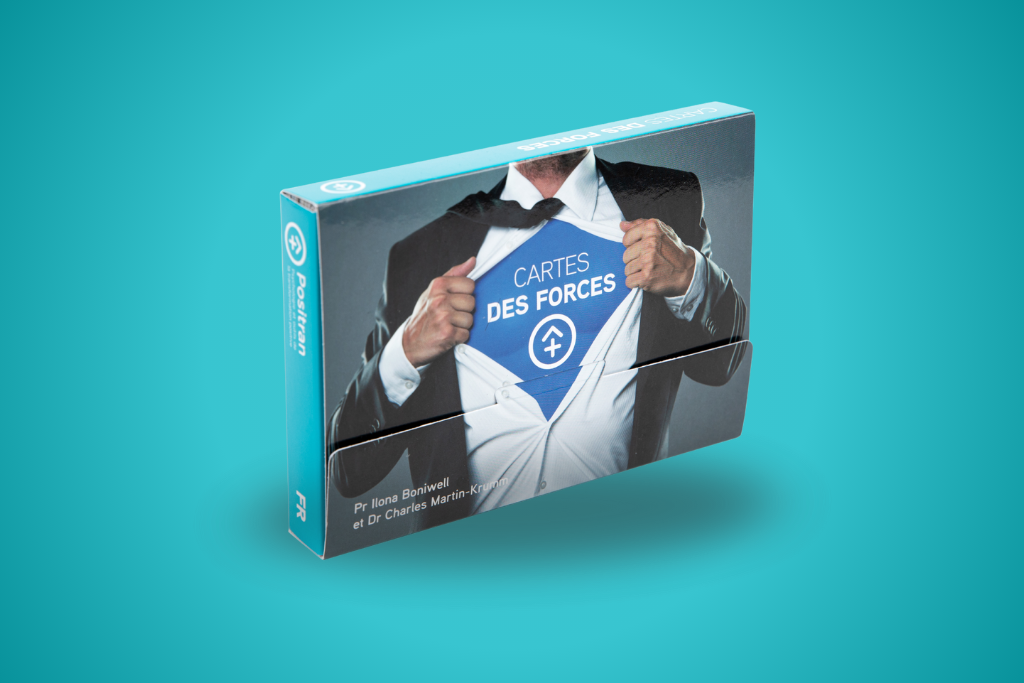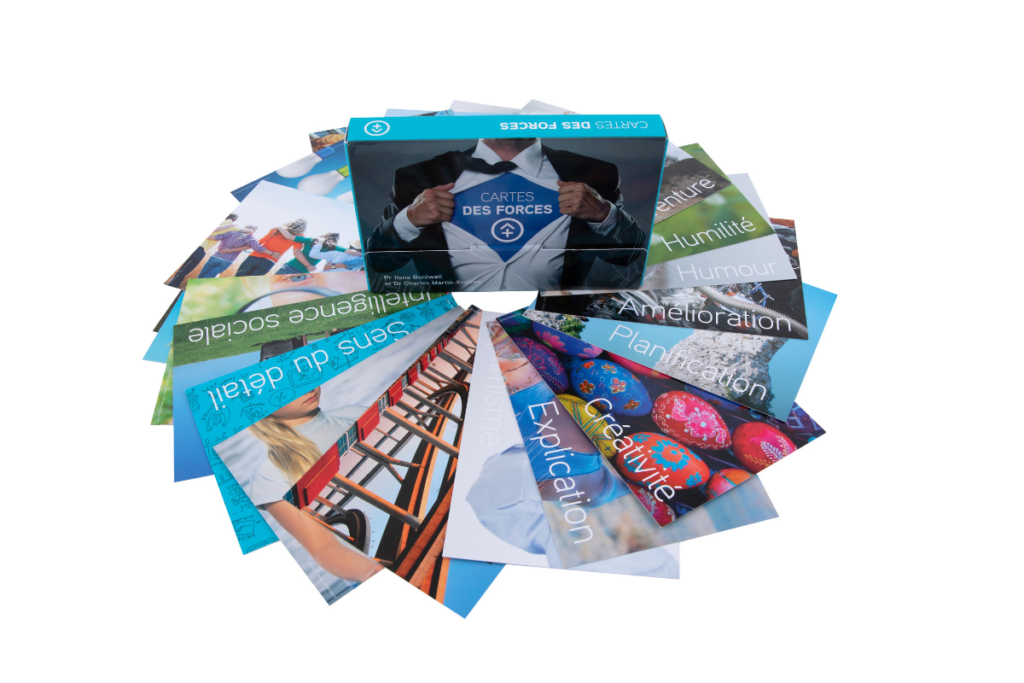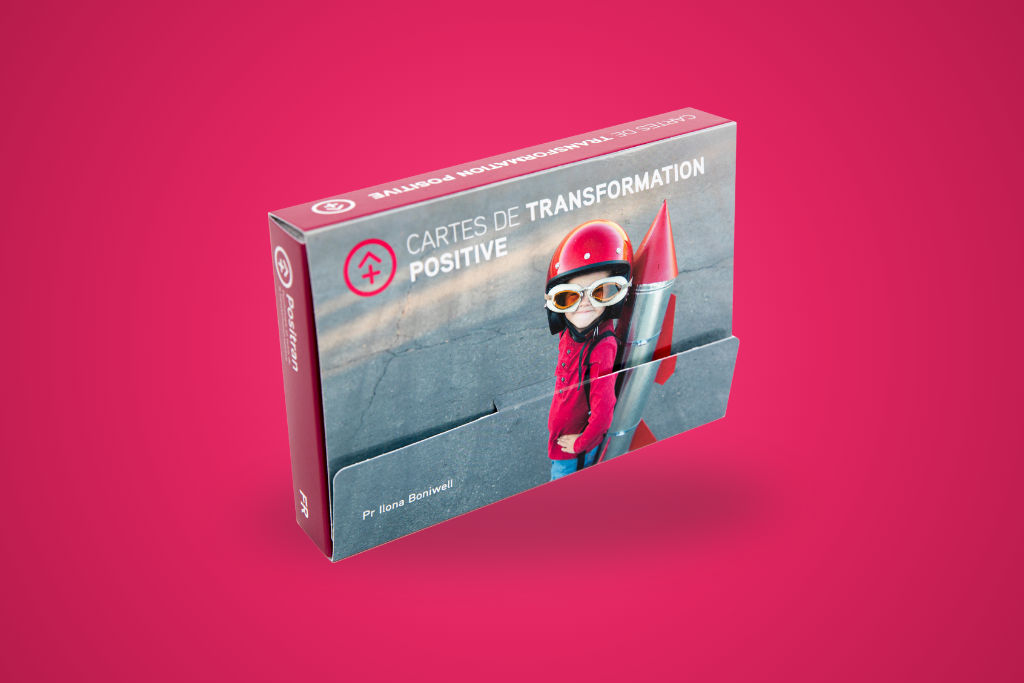
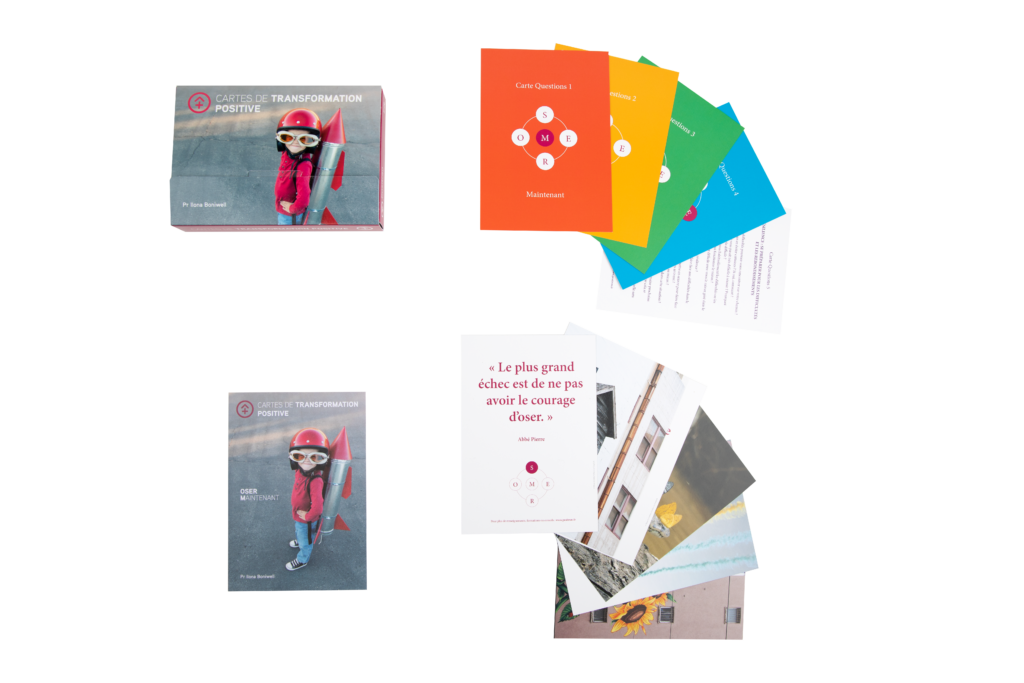
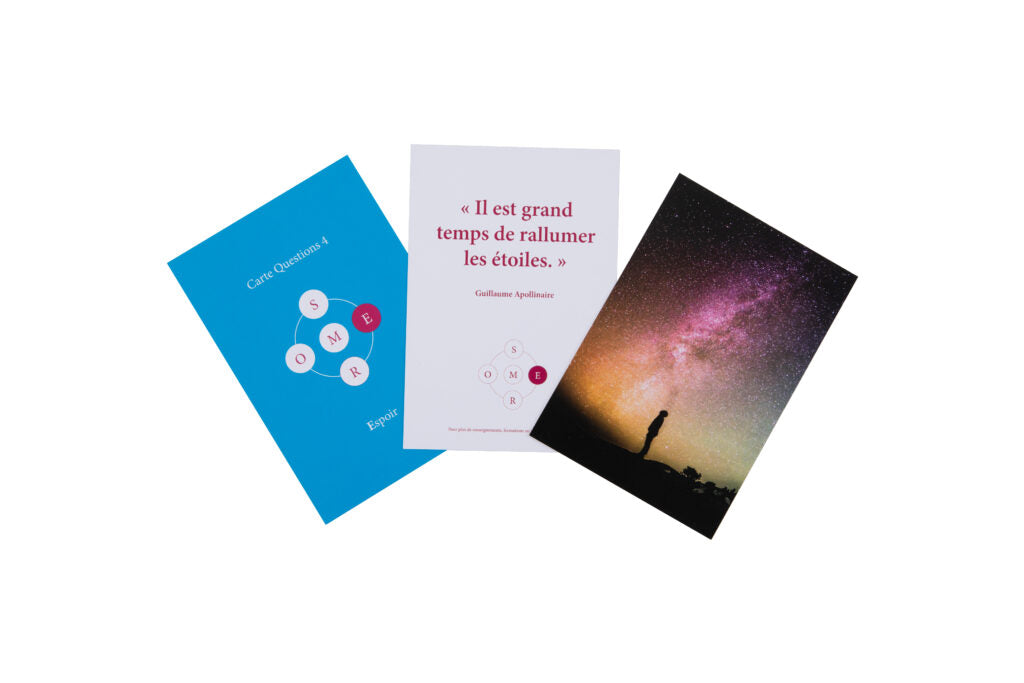
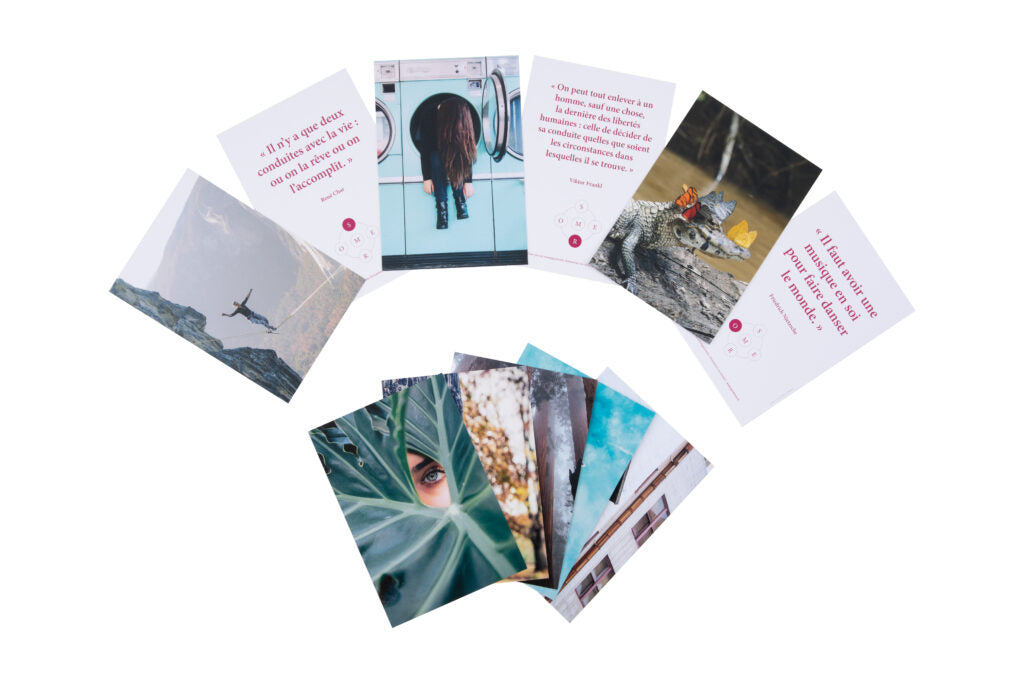
Positive Transformation Cards
Move forward serenely through your times of change
Based on the theory of psychological capital and using poignant images, profound quotes and powerful questions, the Positive Transformation Cards will help you or your client cope with life's changes.
What resources do you need to mobilize? How do you decide and move forward?
These cards accompany you on your transformation journey and activate the function within you TO DARE M (HERO) the one that embodies hope, confidence, resilience, and optimism to act now.

Product Description
The HERO model brings these four qualities together and defines them as psychological capital: a positive psychological state characterised by:
Hope: staying committed to your goals and adjusting your path when needed.
Efficacy (Self-efficacy): having the confidence to take on challenges and put in the effort required to succeed.
Resilience: overcoming setbacks and adversity, bouncing back and even growing stronger through the process.
Optimism: maintaining a positive outlook about your ability to succeed now and in the future.
Together, these psychological resources Psychological Capital (PsyCap) have a greater positive impact on performance, at work and in life, than each of them would individually. In other words, people who score highly across all four qualities tend to perform more consistently and at a higher level.
More recently, a fifth element has been proposed as the starting point of the HERO journey :
Mindfulness: our ability to deliberately bring full attention to the present moment.
A mindful HERO is someone who can stay grounded in the here and now, moving forward without being held back by the fear of failure.
How do you awaken the mindful HERO within you?
The Positive Transformation Cards are a coaching tool designed to support you on this journey. They focus on the five core skills needed for positive inner change.
The path of the Mindful HERO is about learning to trust yourself and finding reasons to smile, no matter the circumstances. This journey is guided by a selection of inspiring images and thought-provoking quotes.
The Positive Transformation Cards are divided into five categories aligned with the Mindful HERO acronym. In addition to the 60 illustrated cards organised across the five categories and the quotes on the back of each card, the set includes five coaching-question cards (12 questions each) designed to explore the positive transformation process and activate your Mindful HERO.
Who is it for?
These cards are aimed at both individuals and professionals and can be used alone, in pairs or in groups.
They are particularly interesting and useful for care, help and support professionals (therapists, coaches, mediators, nurses, etc.), for those seeking effective communication (teachers, managers, HR, etc.) and for anyone who wants to explore their creativity and “not so conscious” thoughts (artists, but also individuals).
Its use
1. When using the cards in a structured coaching session, therapy, or personal exploration:
Start by choosing a challenging situation or a transformation goal you want to work on. Then follow the process below. You can also use the question cards if you want a deeper, more guided exploration.
As you ask questions, either to yourself or to your client use the Mindful HERO model to select five cards. Let your intuition guide you; pick the images you naturally feel drawn to. Arrange the five cards in a circle, with the Mindfulness card in the center.
Mindfulness : This card represents where you are right now. What do you notice in the image? What does it tell you about your situation? What shift or change is needed?
Hope : What are you hoping for? What outcome do you want? Where do you want to go, and what will motivate you to take the first step?
Efficacy : How do you feel about the journey ahead? Look at the colors, shapes and details in the card what do they reveal about your strengths? How confident do you feel facing this challenge?
Resilience : What obstacles might you encounter along the way? How can you prepare for them? What resources can you rely on to help you move through difficulties?
Optimism : What mindset or belief will help you create a positive outcome? Are you ready to step into the unknown? What’s the very first action you’ll take?
When you’ve finished the process, turn the cards over and read the quotes. How do these wise words enrich or strengthen the insights you’ve gained?
2. When combining images with the question cards:
Focus on a meaningful question, topic or challenge. Choose a card (or invite your client to choose one), either intentionally or at random.
These cards are especially helpful for encouraging self-expression around sensitive or complex issues.
Study the image closely, notice the small details, let associations arise freely, and allow your imagination to expand the story.
Then choose a question from one of the question cards again, intentionally or at random. Read it slowly and let the ideas from the image, the question and the quote come together.
Finally, listen to what emerges and express the insights that inspire action.
Spread the cards out on the floor and invite participants to select the ones that inspire them in relation to the workshop theme (product improvement, new concepts, new services, etc.).
These cards can spark unexpected associations and lead to fresh, useful ideas. They are an excellent tool for shifting perspectives and enhancing teamwork.
The HERO model brings these four qualities together and defines them as psychological capital: a positive psychological state characterised by:
Hope: staying committed to your goals and adjusting your path when needed.
Efficacy (Self-efficacy): having the confidence to take on challenges and put in the effort required to succeed.
Resilience: overcoming setbacks and adversity, bouncing back and even growing stronger through the process.
Optimism: maintaining a positive outlook about your ability to succeed now and in the future.
Together, these psychological resources Psychological Capital (PsyCap) have a greater positive impact on performance, at work and in life, than each of them would individually. In other words, people who score highly across all four qualities tend to perform more consistently and at a higher level.
More recently, a fifth element has been proposed as the starting point of the HERO journey :
Mindfulness: our ability to deliberately bring full attention to the present moment.
A mindful HERO is someone who can stay grounded in the here and now, moving forward without being held back by the fear of failure.
How do you awaken the mindful HERO within you?
The Positive Transformation Cards are a coaching tool designed to support you on this journey. They focus on the five core skills needed for positive inner change.
The path of the Mindful HERO is about learning to trust yourself and finding reasons to smile, no matter the circumstances. This journey is guided by a selection of inspiring images and thought-provoking quotes.
The Positive Transformation Cards are divided into five categories aligned with the Mindful HERO acronym. In addition to the 60 illustrated cards organised across the five categories and the quotes on the back of each card, the set includes five coaching-question cards (12 questions each) designed to explore the positive transformation process and activate your Mindful HERO.
These cards are aimed at both individuals and professionals and can be used alone, in pairs or in groups.
They are particularly interesting and useful for care, help and support professionals (therapists, coaches, mediators, nurses, etc.), for those seeking effective communication (teachers, managers, HR, etc.) and for anyone who wants to explore their creativity and “not so conscious” thoughts (artists, but also individuals).
1. When using the cards in a structured coaching session, therapy, or personal exploration:
Start by choosing a challenging situation or a transformation goal you want to work on. Then follow the process below. You can also use the question cards if you want a deeper, more guided exploration.
As you ask questions, either to yourself or to your client use the Mindful HERO model to select five cards. Let your intuition guide you; pick the images you naturally feel drawn to. Arrange the five cards in a circle, with the Mindfulness card in the center.
Mindfulness : This card represents where you are right now. What do you notice in the image? What does it tell you about your situation? What shift or change is needed?
Hope : What are you hoping for? What outcome do you want? Where do you want to go, and what will motivate you to take the first step?
Efficacy : How do you feel about the journey ahead? Look at the colors, shapes and details in the card what do they reveal about your strengths? How confident do you feel facing this challenge?
Resilience : What obstacles might you encounter along the way? How can you prepare for them? What resources can you rely on to help you move through difficulties?
Optimism : What mindset or belief will help you create a positive outcome? Are you ready to step into the unknown? What’s the very first action you’ll take?
When you’ve finished the process, turn the cards over and read the quotes. How do these wise words enrich or strengthen the insights you’ve gained?
2. When combining images with the question cards:
Focus on a meaningful question, topic or challenge. Choose a card (or invite your client to choose one), either intentionally or at random.
These cards are especially helpful for encouraging self-expression around sensitive or complex issues.
Study the image closely, notice the small details, let associations arise freely, and allow your imagination to expand the story.
Then choose a question from one of the question cards again, intentionally or at random. Read it slowly and let the ideas from the image, the question and the quote come together.
Finally, listen to what emerges and express the insights that inspire action.
Spread the cards out on the floor and invite participants to select the ones that inspire them in relation to the workshop theme (product improvement, new concepts, new services, etc.).
These cards can spark unexpected associations and lead to fresh, useful ideas. They are an excellent tool for shifting perspectives and enhancing teamwork.
